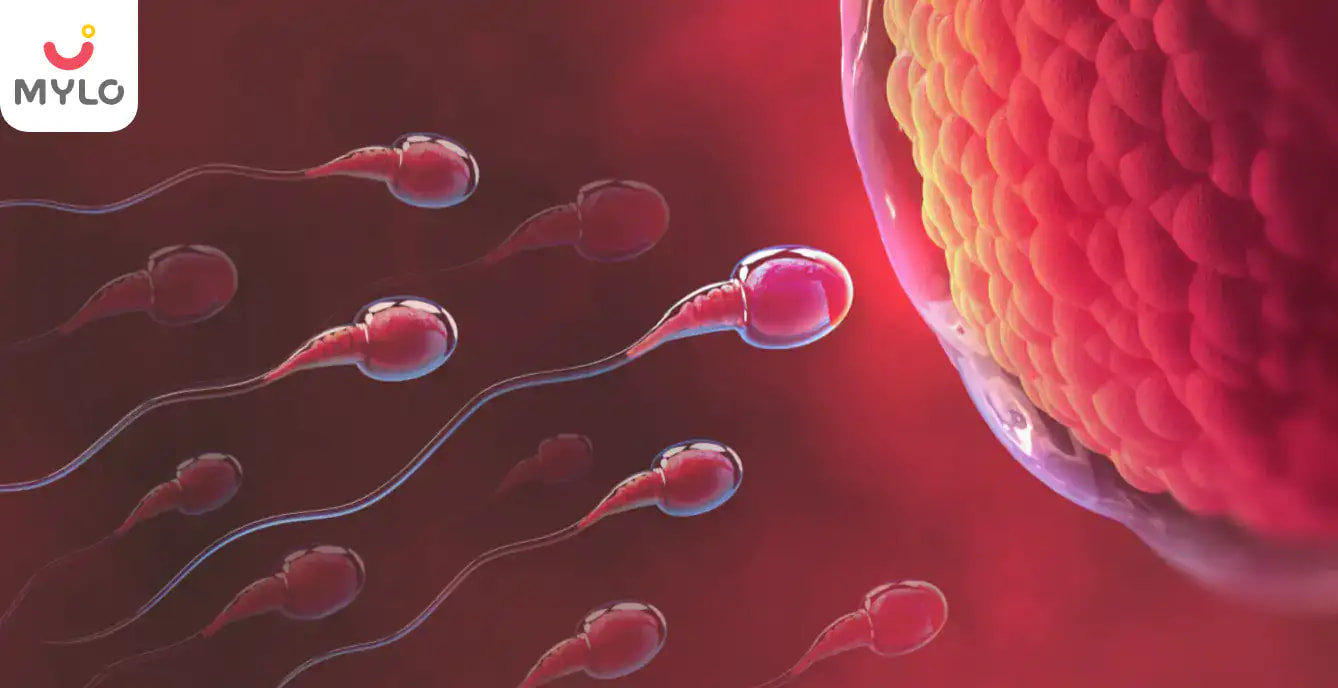Home

What are The Most Common Early Signs of Pregnancy Through Intrauterine Insemination (IUI)?
In this Article

Pregnancy
What are The Most Common Early Signs of Pregnancy Through Intrauterine Insemination (IUI)?
Updated on 3 November 2023
Women undergo intrauterine insemination (IUI), a type of assisted reproduction in case of unexplained infertility, male infertility, etc. These problems may prevent women from becoming pregnant naturally. The sperm specimen is placed within the uterus during intrauterine insemination using a catheter-like instrument. If successful, the first indication of IUI pregnancy could appear as soon as two or three weeks after the embryo is implanted.
How Soon Can an IUI Pregnancy be Confirmed?
Waiting for pregnancy symptoms can be stressful or upsetting after multiple cycles of intrauterine insemination. One must wait at least two weeks before taking home pregnancy tests to determine an IUI pregnancy. A blood test is one of the most reliable ways to determine whether the pregnancy is successful due to its accuracy. When getting a blood test, some women may show physical pregnancy indicators. Others can lack the bloodstream levels of pregnancy hormones necessary to experience symptoms.
The zygote will not enter the uterus for four to six days after fertilising the egg. Implantation may take up to five days. The pregnancy test will successfully confirm the IUI pregnancy only once the HCG levels increase. Consequently, a pregnancy test should be taken at least two weeks or 14 days following intrauterine insemination.
Early signs of an IUI pregnancy
Pregnancy symptoms following intrauterine insemination or in vitro fertilisation (IVF) procedures are similar to normal pregnancies resulting from intercourse. Regardless of how the pregnancy occurs, the body creates the same hormones. However, IUI pregnancy shouldn’t be based on the symptoms solely, as every woman experiences pregnancy symptoms differently. Only a blood test can reliably determine whether a woman is pregnant.
1. Implantation bleeding
Implantation bleeding can resemble spotting before menstruation. The embryo embedding itself in the uterus wall naturally causes bleeding that occurs two weeks following intrauterine insemination. Some women may not experience implantation bleeding, whereas, in others, it may occur between six to twelve days following conception. Mild cramps may accompany the bleeding.
2. Menstrual delay
The body's hormonal changes might cause a delay in menstruation. It is best to involve the doctor in this case. Once IUI pregnancy has been identified, spotting and cramping may follow suit.
3. Breast tenderness
One common side effect of intrauterine insemination is sensitive, painful, and tender breasts. However, a test result may be necessary if the breast tenderness persists after the periods are delayed.
4. Fatigue
It is absolutely normal to feel weak and exhausted after intrauterine insemination. An increase in progesterone levels can contribute to fatigue and sleepiness. The body will expend much energy while preparing for pregnancy by producing more blood. Increased levels of oestrogen hormone can cause the stomach to feel empty, resulting in nausea. Nausea or morning sickness may result from the hormone play during an IUI pregnancy. However, this may not be everybody’s experience.
5. Food cravings and aversions
One may also experience food cravings or aversions because of hormonal changes taking place inside the body. However, some desires may also be linked to a body’s mineral inadequacies. Following intrauterine insemination, the cravings should be noted and discussed with a doctor.
6. High body temperature
The body temperature may rise due to increased progesterone. A rise in body temperature over more than 20 days is a positive indication of an IUI pregnancy.
How to Prepare for Intrauterine Insemination
The male partner will be asked to bring his specimen from the sperm bank to the fertility clinic. The sperm first undergoes “washing.” The lab staff separates the healthiest sperm from the sample after the sperm is “washed.” They also take out seminal fluid that shouldn’t enter the uterus.
You may also like: Importance of preconception counselling and care
Sperm washing ensures that the uterus receives only the most viable sperm to maximise the chances of conception. The woman will then lie on the examination room table. The physician will insert a tiny tube or catheter through the cervix into the uterus to inject the sperm.
The IUI treatment will take 20 to 25 minutes to perform. The procedure does not require an anaesthetic. The patient is encouraged to relax for up to 20 minutes after the procedure since dizziness or moderate cramps may develop in some patients as a side effect.
References
- Cohlen, B. (2018). IUI: review and systematic assessment of the evidence that supports global recommendations. www.academic.oup.com



Written by
Roohi Kalra
Get baby's diet chart, and growth tips

Related Articles
Related Questions
Hello frnds..still no pain...doctor said head fix nhi hua hai..bt vagina me pain hai aur back pain bhi... anyone having same issues??

Kon kon c chije aisi hai jo pregnancy mei gas acidity jalan karti hain... Koi btayega plz bcz mujhe aksar khane ke baad hi samagh aata hai ki is chij se gas acidity jalan ho gyi hai. Please share your knowledge

I am 13 week pregnancy. Anyone having Storione-xt tablet. It better to have morning or night ???

Hlo to be moms....i hv a query...in my 9.5 wk i feel body joint pain like in ankle, knee, wrist, shoulder, toes....pain intensity is high...i cnt sleep....what should i do pls help....cn i cosult my doc.

Influenza and boostrix injection kisiko laga hai kya 8 month pregnancy me and q lagta hai ye plz reply me

Related Topics
RECENTLY PUBLISHED ARTICLES
our most recent articles

Diet & Nutrition
গর্ভাবস্থায় আলুবোখরা: উপকারিতা ও ঝুঁকি | Prunes During Pregnancy: Benefits & Risks in Bengali

Diet & Nutrition
গর্ভাবস্থায় হিং | ঝুঁকি, সুবিধা এবং অন্যান্য চিকিৎসা | Hing During Pregnancy | Risks, Benefits & Other Treatments in Bengali

Women Specific Issues
স্তনের উপর সাদা দাগ: লক্ষণ, কারণ এবং চিকিৎসা | White Spots on Nipple: Causes, Symptoms, and Treatments in Bengali

Diet & Nutrition
গর্ভাবস্থায় পোহা: উপকারিতা, ধরণ এবং রেসিপি | Poha During Pregnancy: Benefits, Types & Recipes in Bengali

Diet & Nutrition
গর্ভাবস্থায় মাছ: উপকারিতা এবং ঝুঁকি | Fish In Pregnancy: Benefits and Risks in Bengali

Diet & Nutrition
গর্ভাবস্থায় রেড ওয়াইন: পার্শ্ব প্রতিক্রিয়া এবং নির্দেশিকা | Red Wine During Pregnancy: Side Effects & Guidelines in Bengali
- ইনার থাই চ্যাফিং: কারণ, উপসর্গ এবং চিকিৎসা | Inner Thigh Chafing: Causes, Symptoms & Treatment in Bengali
- গর্ভাবস্থায় ব্রাউন রাইস: উপকারিতা ও সতর্কতা | Brown Rice During Pregnancy: Benefits & Precautions in Bengali
- Velamentous Cord Insertion - Precautions, Results & Safety
- Unlock the Secret to Flawless Skin: 7 Must-Have Qualities in a Face Serum
- Unlock the Secret to Radiant Skin: How Vitamin C Serum Can Transform Your Complexion
- Gender No Bar: 10 Reasons Why Everyone Needs a Body Lotion
- Unlock the Secret to Radiant Skin How to Choose the Perfect Body Lotion for Your Skin Type
- Top 10 Reasons to Apply a Body Lotion After Every Bath
- Communication in Toddlers: Milestones & Activities
- How to Improve Vocabulary for Toddlers?
- A Comprehensive Guide to Understanding Placenta Accreta
- Vulvovaginitis in Toddlers Causes, Symptoms and Treatment
- A Comprehensive Guide to Understanding Cerebral Palsy in Children
- Bitter Taste in Mouth During Pregnancy: Understanding the Causes and Remedies


AWARDS AND RECOGNITION

Mylo wins Forbes D2C Disruptor award

Mylo wins The Economic Times Promising Brands 2022
AS SEEN IN

- Mylo Care: Effective and science-backed personal care and wellness solutions for a joyful you.
- Mylo Baby: Science-backed, gentle and effective personal care & hygiene range for your little one.
- Mylo Community: Trusted and empathetic community of 10mn+ parents and experts.
Product Categories
baby carrier | baby soap | baby wipes | stretch marks cream | baby cream | baby shampoo | baby massage oil | baby hair oil | stretch marks oil | baby body wash | baby powder | baby lotion | diaper rash cream | newborn diapers | teether | baby kajal | baby diapers | cloth diapers |








